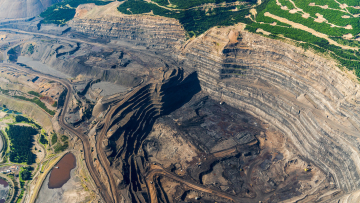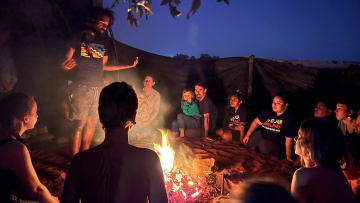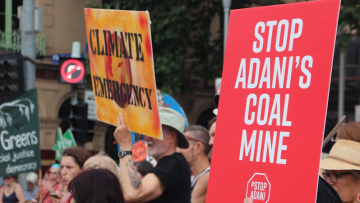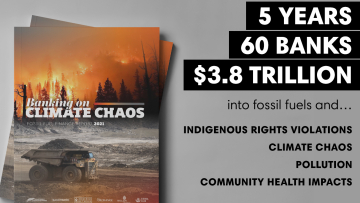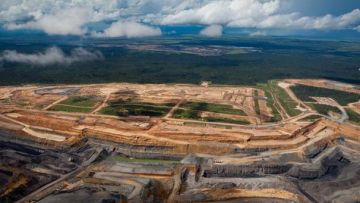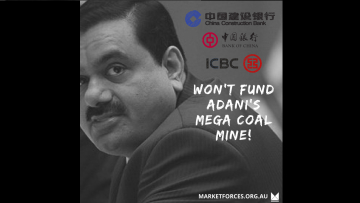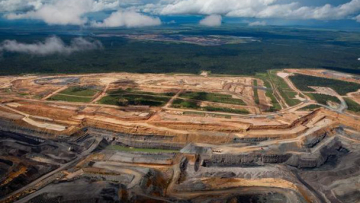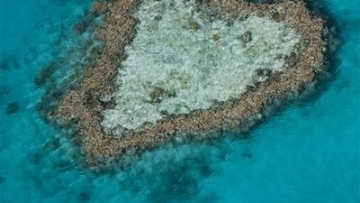Project – On record
This profile is no longer actively maintained, with the information now possibly out of date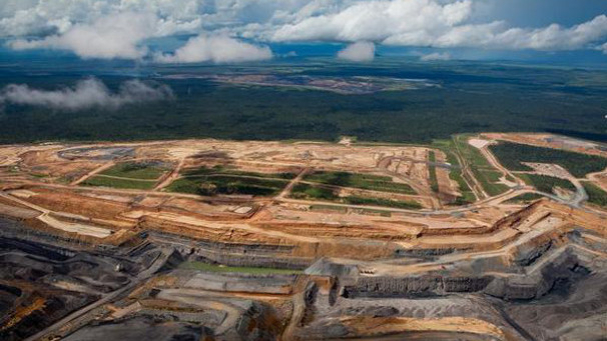
Project – On record
This profile is no longer actively maintained, with the information now possibly out of dateWhy this profile?
The Carmichael coal mine project is built on the ancestral lands of Indigenous Australians who never gave Adani their consent. The project is having a negative impact upon its immediate environment, but it is also contributing significantly to climate breakdown: Carmichael will emit approximately 4.7 billion tonnes of carbon pollution over its anticipated 60-year lifespan.
What must happen
Banks and other financial institutions should declare their intention not to finance the Carmichael coal mine project. Banks providing services for Adani must refuse to arrange finance for any mine expansions and demand the winding down of extraction as soon as possible.
| Take Action! |
| #StopAdani |
| Sectors | Coal Mining |
| Location |
|
| Status |
Planning
Design
Agreement
Construction
Operation
Closure
Decommission
|
| Website | https://www.bravus.com.au/carmichael-mine/ |
The Carmichael coal mine project is located in Australia’s North Galilee Basin, in central Queensland. The open-cut mine is owned and operated by the Indian conglomerate Adani, which renamed its Australian arm to Bravus Mining and Resources in late 2020. The mine has the production approval for 60 million tonnes of thermal coal per year, but in 2018 this goal was scaled down to 10 million tonnes per year when Adani struggled to obtain sufficient funds. Accordingly, construction costs shrank from an estimated AUD 16.5 billion to AUD 2 billion. The project incorporates hundreds of kilometres of railway tracks, leading to the North Queensland Export Terminal, which threatens the Great Barrier Reef. From there, Carmichael’s coal is shipped to India and Southeast Asia. Construction began in June 2019 and the mine’s first shipment left Australia at the end of 2021.
Impact on human rights and communities
The infringement of Indigenous Australian rights has been central to the development of the Carmichael coal mine. The facility has been built on the land of the Wangan and Jagalingou peoples, who strongly opposed the project. In 2018, an Australian court quashed a case brought against Adani’s plans by the Wangan and Jagalingou peoples. In August 2019, it was revealed that the Queensland government had granted Adani exclusive possession freehold title over the land in question, without any public consultation. This decision effectively made Wangan and Jagalingou protestors trespassers on what is considered to be their traditional lands.
Impact on climate
Colossal carbon dioxide emissions will follow as Carmichael’s coal reserves are steadily extracted and burned. The mine produces 10 million tonnes of coal per year, making it responsible for emitting an estimated 20 million tonnes of CO2. If the mine fulfils its potential, output would increase to 60 million tonnes of coal per year.
In 2015, The Australia Institute think tank calculated that, if and when Carmichael produces 60 million tonnes of coal per year, it will have higher annual emissions than Bangladesh. In 2017, the Climate Council of Australia reported that the country must not develop any new thermal coal mines if Australia’s commitments under the Paris Climate Agreement are to be achieved.
Impact on nature and environment
Vital habitat is being lost to make way for the Carmichael project’s sprawl. If the mine reaches full capacity it will cover 44,700 hectares, including 20,000 of bushland that sustains threatened species. For example, 16,000 hectares of endangered black-throated finch habitat has already been impacted or destroyed and in April 2022, conservationists accused Adani of failing to respect its habitat offsetting commitments.
Significant local groundwater drawdown threatens an array of habitats and animals. A Great Artesian Basin discharge spring wetland called Doongmabulla Springs will be impacted, which hosts endemic and threatened plant species that may not survive without it. In 2021, a scientific paper authored by Adelaide’s Flinders University concluded that the hydrogeology of this wetland was still not adequately understood, which puts it at risk of irreversible decline.
Necessary for the mine’s operations, this drawdown is expected to impact groundwater-dependent species and communities along the Carmichael River, such as red river gum trees that provide koala habitat. The ‘Water Resources’ chapter of the Carmichael coal mine’s Environmental Impact Assessment (EIS) states “riparian vegetation, particularly the stands of mature River Red Gum and Paper Bark tree communities, may be potentially impacted by a reduction in the direct groundwater discharges underlying the river and discharge from the Doongmabulla Springs. Any significant reduction in groundwater levels and or surface water flows in the Carmichael River [...] has the potential to impact on the health of these communities.” The EIS failed to analyse this impact, instead suggesting “ongoing monitoring [...] to quantify the magnitude of these impacts.”
The draining of water sources in the wider area is necessary for the Carmichael project. In June 2018, Adani stated its intentions to take 10 billion litres of water from the Suttor River for the mine, necessitating a dam and pipeline. Approximately 300 kilometres east of the North Galilee Basin, the area surrounding the Sutton River was experiencing a drought at the time. Adani claimed an EIS was unnecessary for this proposal however, because it was not covered by a Federal water trigger. Such tactics raised the question of whether or not Australia’s development approvals system is adequately equipped to protect the environment.
Other impacts
The erosion of state authority and environmental protections is a long-established Adani hallmark. Adani's flagship project is the largest private port in India, Mundra in Gujarat. Adani deliberately concealed and falsified material facts during Mundra’s application process. Construction began illegally and multiple violations of the development approvals included the mass clearing of mangroves.
In 2020, Adani pled guilty to giving 'false or misleading documents’ to Queensland's environmental regulator and was fined AUD 20,000.
In late 2018, Adani announced that it would finance the Carmichael project itself, but in August 2021 it was reported that the State Bank of India was still considering arranging a AUD 1 billion loan for Bravus Mining and Resources (Adani Australia).
It has been established that a selection of other banks could also be financing the Carmichael project unintentionally. Deutsche Bank, Standard Chartered, Barclays and JPMorgan Chase all refused to arrange finance for Carmichael, but each was appointed to run a USD 1.25 billion bond issue for Adani Ports and Special Economic Zone (APSEZ) in 2020; Adani may be able to shift these funds to Australia.
For financiers of Adani see BankTrack's Adani Group profile.
In August 2015, Commonwealth Bank of Australia (CBA), followed by Standard Chartered, backed off from the Carmichael project. In September 2015 National Australia Bank (NAB) declared to rule out financing for the Carmichael project, adding itself to a list of fourteen international banks (among them Deutsche Bank, HSBC, State Bank of India) which already decided so.
Applicable norms and standards
Tomorrow’s Generation: The Adani Carmichael Coal Mine
Market Forces: NAB rules out funding for Carmichael coal mine
UNESCO: Protect the Great Barrier Reef, Not Coal!
Greenpeace threatened Species Unit in the Leard State Forest
Abbot Point Wetlands: why risk this beautiful place for coal?
Greenpeace action against coal
Dirty vabks Financing Australian Coal
Great Barrier Reef: Thrills and Spills
2022
2022-05-26 00:00:00 | Study declares Galilee Basin coal projects economically unviable
An analysis by German academics in conjunction with Australian experts has concluded that any new coal mines in Australia’s Galilee Basin are economically unviable in the long-term. The study says there is a high chance that any such project – including Adani’s Carmichael coal mine project – will become a stranded asset.
2021
2021-12-29 00:00:00 | Carmichael’s first coal shipment has left Australia
Following years of financial and environmental obstacles, the Carmichael coal mine project’s first shipment has set sail from the North Queensland Export Terminal. CEO David Boshoff said the project will “supply high-quality Queensland coal to nations determined to lift millions of their citizens out of energy poverty”.
2020
2020-12-01 00:00:00 | Amundi issues green bond warning to SBI
The French asset manager Amundi has threatened to sell green bonds it holds in State Bank of India (SBI), if the bank grants its proposed USD 650 million loan for Adani's Carmichael coal mine.
2020-11-17 00:00:00 | State Bank of India set to arrange Bravus coal mine loan
The State Bank of India (SBI) is set to arrange a USD 650 million loan for Adani’s Australian mining company, Bravus. Bravus is behind the controversial new Carmichael coal mine project.
2020-10-01 00:00:00 | Queensland signs deal permitting deferment of Adani royalty payments
In a move described as a “disgrace” by the Australian Conservation Foundation, the Queensland government has signed a deal permitting Adani to defer the payment of Carmichael coal mine royalties. Adani has been struggling to secure finance for the project, so this deal will facilitate cash flows.
2020-09-10 00:00:00 | Adani forced to haul its own coal
It has been revealed that Adani plans to establish its own rail company to transport its Carmichael coal from pit to port. Called Bowen Rail Company, there is no mention of Adani or Carmichael in any of its communications. Owned by Adani Ports and Special Economic Zone (APSEZ), Bowen Rail Company represents an opportunity for Adani to funnel money from APSEZ financiers into the unpopular Carmichael project.
2020-06-04 00:00:00 | Adani signs AUD 350 million deal for the construction of rail network
Adani has signed a AUD 350 million contract with BMD Group for the construction of a 200-kilometre rail network for its Carmichael coal mine.
2019
2019-06-13 00:00:00 | Carmichael mine receives final approval from state government
Queensland’s Department of Environment and Science has approved the Carmichael coal mine project’s Groundwater Dependent Ecosystems Management Plan. This final approval leaves Adani free to start construction.
2018
2018-11-05 00:00:00 | Adani shrinks plans for Carmichael coal mine project
Adani has scaled back its Carmichael coal mine plans, reducing the amount of capital needed by 80% to less than AUD 3 billion. The mine will now be built in phases and production will start at 10-15 million tonnes of coal per year, before expanding to 27 million (which would still rank Carmichael among Australia’s biggest coal mines). Plans for a new Abbot Point coal terminal have been shelved and the existing terminal will instead be expanded. This change has almost halved the rail line cost from approximately AUD 2.5 billion to AUD 1.2 billion.
2018-08-17 00:00:00 | Indigenous case against Carmichael mine thrown out
A court in Brisbane has quashed a case against Indian coal company Adani, brought by the Wangan and Jagalingou Indigenous people of Queensland’s Galilee Basin. The case argued that Adani did not seek the views of the Wangan and Jagalingou people regarding the Carmichael coal mine project.
2017
2017-08-29 00:00:00 | Adani to begin construction of Carmichael coal mine in October
Indian mining giant Adani has announced it will break ground on the Carmichael coal mine in October. The facility’s first coal is expected in March 2020.
2017-07-03 00:00:00 | Activists claim 21 banks have ruled out Carmichael financing
Adani is struggling to secure financing for its controversial Carmichael coal mine project. Research by green activists has established that 21 banks have so far steered clear of Adani’s mine, including the Commonwealth Bank of Australia, Standard Chartered, National Australia Bank, Deutsche Bank, HSBC and the State Bank of India.
2017-06-06 00:00:00 | Adani gives green light to Carmichael coal mine project
Indian billionaire Gautam Adani has approved the Carmichael coal mine and rail project. Bank financing for the project is still lacking and the company is yet to secure its bid for a AUD 900 million infrastructure loan from the Australian federal government. The loan would build a railway to Queensland’s Galilee Basin, which would open up the region to the wider mining industry. Adani’s top executive in Australia, Jeyakumar Janakaraj, voiced his displeasure with “activists who sit in creature comfort and criticise us”.
2017-02-15 00:00:00 | Environmental Justice Australia reveals Adani's disastrous track record
A detailed legal research brief by Environmental Justice Australia has revealed Adani’s long history of illegal dealings, bribery, environmental and social devastation, as well as a collection of allegations of corruption, fraud and money laundering at the company. The Adani Brief demonstrates that Australian governments and potential financiers are exposing themselves to financial and reputational risks by backing the Carmichael project.
2016
2016-12-22 00:00:00 | Indian agencies investigate Adani
Adani Enterprises is one of several coal companies under investigation by India’s Directorate of Revenue Intelligence (DRI) for inflating the cost of imported coal. For a decade, the DRI has been investigating Adani entities that traded in diamonds and gold jewellery. Adani Enterprises was named in a 2011 report by Karnataka’s state ombudsman, after documents seized by police allegedly “indicate that money has been regularly paid to port authorities, customs authorities, [the] police department, mines and geology and even to MLAs/MPs.” Adani has rejected the allegations.
2016-04-03 00:00:00 | Queensland approves mining leases for Carmichael project
The Queensland government has approved the mining leases for Adani’s Carmichael coal mine project. Adani says a Final Investment Decision will not be made until court challenges against the project are resolved.
2016-02-04 00:00:00 | Adani freezes investment in Carmichael mine until world coal price recovers
Adani has frozen its investment in Australia's largest proposed coal mine until world coal prices show a clear recovery. Executives indicated the move in Indian stock analyst briefings, which has spurred speculation that Adani might abandon the Carmichael coal mine as the company moves into solar energy.
2016-02-02 00:00:00 | Adani's Carmichael mine gains final environmental approval
Adani's Carmichael coal mine has received its final environmental approval from the Queensland government. The project still requires a mining lease and bank funding before it can proceed.
2015
2015-10-16 00:00:00 | Carmichael coal mine granted ‘re-approval’ by Australian government
The Indian mining giant Adani has received a "re-approval" from the Australian government for its controversial Carmichael coal project. The offer has 36 environmental conditions however, which Australia’s environment minister Greg Hunt describes as the "toughest in the country's history".
2015-08-05 00:00:00 | Adani loses federal approval for Carmichael coal project
Australia’s federal court has ruled in favour of a legal challenge to Adani by the Mackay Conservation Group. The group says the rejection of Adani’s under-construction Carmichael mine is “a victory for land and water, biodiversity, the global climate and also for common sense”.
2015-03-26 00:00:00 | Galilee Basin’s traditional land owners reject Adani agreement
The Wangan and Jagalingou people, who are considered the traditional owners of the land in the Galilee Basin, have rejected an Indigenous Land Use Agreement with Adani. Adani is planning to build the Carmichael coal mine project on their land.
2014
2014-07-28 00:00:00 | Australia’s federal government approves Carmichael mine
Australia’s environment minister Greg Hunt has approved the Carmichael coal mine and rail project. The Mackay Conservation Group says Hunt has incorrectly assessed the mine’s impact on both climate change and two vulnerable local species.
2014-05-08 00:00:00 | Queensland approves Carmichael mine
Queensland's coordinator general has approved the state’s Carmichael coal project. Subject to 190 construction and operation conditions, the approval pays particular attention to groundwaters and water bores that may be impacted by the mine.
2014-05-06 00:00:00 | IEEFA report finds Carmichael coal exports financially unviable
The Australasia Institute for Energy Economics and Financial Analysis has published a report that casts doubt on claims that the Carmichael coal mine project will alleviate India's energy poverty. The report finds that in order to be financially viable, coal exported from Australia’s Galilee Basin to India would need a wholesale electricity price that is double India's current level.
2013
2013-11-22 00:00:00 | Queensland invites comments on Carmichael mine
Queensland’s coordinator general, Barry Broe, has invited Queensland state agencies and community members to submit comments on the proposed AUD 16.5 billion Carmichael coal mine and rail project.
2010
2010-11-24 00:00:00 | Adani begins approval process for two Australian mines
Adani has begun the approval process to establish two new mines (including the Carmichael coal mine) and a rail line in Australia’s Galilee Basin. The Queensland premier Anna Bligh has designated the proposed Carmichael coal mine and rail facility as a “Significant Project”.

